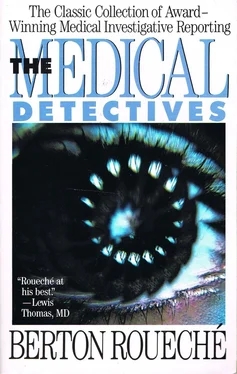"On Monday morning, July 12, a man walked into my room carrying a camera and a black bag. He stopped at the foot of the bed, and said, 'I can tell you one thing that's the matter.' I stared at him, and he said, 'Your kimono is not tied the right way. I've been to Japan, and the Japanese are very careful about whether the fold is to the left or the right.' My way—I forget which way it was—meant I was moribund or something. Well, that was my introduction to Dr. Berger—Bernard W. Berger, a dermatologist and, I later learned, an expert on Lyme disease. Dr. Medler had called him in as a consultant. Anyway, he made me laugh with his kimono joke. We talked, and I told him my sad story, and he opened up his camera and took some photographs of my rash. He told me what there was to tell about Lyme disease, and put me on a course of penicillin. Maybe I was already on it; I don't remember. One thing he told me was that in four weeks or so I might have a strange reaction. We talked about the tick bite. He said it could have been a few days before I got sick, or it could have been two weeks. There were certainly plenty of opportunities for me to pick up a tick—the garden, the shrubbery, the woods, the cat. I felt much better after talking with Dr. Berger. I asked Jeffrey to bring me some drawing paper, and I did a little drawing—a self-portrait of me sitting up in bed. There's a color print of it on the wall over there."
The picture was almost a miniature. It was not much bigger than a copy of TV Guide .
I had to go over to get a good look. It showed a dark-haired woman (more hair than face) sitting up in a raised hospital bed. She was wearing a red kimono—a red garment, anyway. A blue-and-white blanket (in July!) was pulled up in pleasing disarray to her waist. There was a suggestion of yellow flowers in a vase in the background. Just beyond her head was the grim shepherd's-crook shaft of an I.V. machine.
"Don't ask me about that I.V.," Miss Bowden said. "I must have had one at some point, but I simply don't remember. The blanket? Well, this is a picture. It's not a scientific illustration. Maybe I was having a chill. That doesn't seem likely, though, does it? I mean, I was discharged the next day. That was Tuesday, July 13—my sixth hospital day. I wasn't exactly well. I was still on oral penicillin. My temperature when I got home in the early afternoon was 98.8 degrees. But at seven o'clock that night it was up to 102.2 degrees. Lyme disease is very strange. I woke up around midnight, and took my temperature again. It was down again—100.2 degrees. The next day, it was normal all day. And so was I. I was well."
Miss Bowden squared her litter of notes and turned a page. "Now," she said, "it's August 27. A Friday. I'd been feeling pretty mean off and on for several weeks. I took a nap every afternoon, so I could go out at night and join the fun. But then on that Friday I began running a little fever, and I didn't seem to have any strength. All my joints and muscles were stiff. The next day, I felt even meaner, and my temperature was 99.6 degrees. By Sunday, I knew I was sick, and I spent a horrible night. It hurt to lie down. There seemed to be weights on my head and chest. I telephoned Dr. Medler on Monday afternoon, and he put me on aspirin. That may have helped some. But my stiffness turned to pain. Particularly in my back, neck, and shoulders. I've never been poked with an electric cattle prod, but I'm sure it would feel exactly like that: a stab of pain, then nothing for a moment or two, then another stab, in a different place. It jumped all over—back, neck, chest, arms, head. Then, maybe because of those jumping pains, I began to feel nauseated. And I developed diarrhea. I called Dr. Medler again the next day, but he was away—his father had died. I talked to an assistant, who suggested that I switch from aspirin to Tylenol. Which I did. I couldn't see that it made much difference. The shooting pains kept shooting, and in between prods I had that pins-and-needles feeling running up and down my hands and feet. I also had a very funny feeling here and there on my midriff and on my arms and cheeks—as if I were being splashed with cold water. About the only misery missing was fever. My temperature stayed at normal. It was very peculiar.
"Dr. Berger had told me that an attack of Lyme disease often had a sequel of some sort. It could be an arthritis. It could involve the heart. It could be neurological. I supposed that I was experiencing one of those sequels, and that mine was taking a neurological form. I don't remember when I began to realize that. I'm confused about a lot of things that aren't set down in my notes. I was too sick to talk to the doctor. Jeffrey did all that for me. At some point, I was put back on penicillin. Around September 1, I began to be really nauseated. I couldn't keep anything on my stomach. I even had trouble with pills. I was vomiting, or trying to, every ten or fifteen minutes. But some of the pains were easing up a bit. I gather from my notes that the next couple of days were much the same. The days weren't as bad as the nights—trying to get comfortable enough to sleep. Then, on Friday, September 3, something new and awful happened. The left side of my mouth began to feel stiff, paralyzed. I remember trying to wash out my mouth with mouthwash, and my mouth wouldn't quite close. The mouthwash just dribbled out. I woke up the next morning, the beginning of the big Labor Day weekend, with the right side of my mouth partly paralyzed. It was almost impossible to eat or drink. I was drooling. And at some point I looked in the bathroom mirror, and I had Chinese eyes. The muscles around the corners of my eyes had gone limp, like my mouth. I learned later that there's a name for all that. I had Bell's palsy. That was the worst—that was the peak. Then, little by little, I began to improve. I had a consultation with an otolaryngologist in Southampton. I had a phone call from Dr. Jorge Benach, an important Lyme-disease investigator at Stony Brook. The days went by. By the middle of the month, I was almost back to normal. But even then, when I really felt well again, I wasn't. It was two months before I could play the flute properly. For a long time, all I could manage was the middle register. It was just a horrible experience. It changed my life. I don't know where I got my tick, but I never go into the woods anymore, I'm careful about petting any animal, and I've given up gardening. I'm going to exercise class, something I never dreamed of doing, but I have to get my strength back. And I never go out in the sun without dark glasses. It seems I have photophobia."
Jeffrey Potter had come into the room while we were talking. He stood just inside a pair of French doors opening on a terrace. He cleared his throat. "I suppose this sounds a bit silly," he said. "But there was a time, when Priscilla was at her worst, when I had an awful thought: We had never talked about death as something that might happen to one of us. I realized that I didn't know if she wanted a burial or cremation. I didn't know if she wanted a funeral, or even a church service. Or a memorial service. Or whatever. I know this sounds morbid and silly. But I thought I'd just mention it. It gives you some idea of how sick I thought she was."
Driving home from the Potters', I thought back to my earlier conversation with Dr. Grunwaldt. The telephone had rung three or four times in the course of our talk. The calls were all from patients, and I gathered from Dr. Grunwaldt's comments that they all had to do with ticks. "Yes," he said, as I was leaving, as he walked me to the door. "There's a lot of concern around here. Not everybody who finds a tick has Lyme disease. But they have the possibility on their minds. So do I. Not everybody I see who has a high fever, with the general symptoms of the flu, has Lyme disease. But when I see those symptoms here in the tick season—in the summer and early fall—I don't think flu. Lyme disease is essentially easily cured if it is properly treated early enough. Even then, of course, it can be very unpleasant. But those of us who practice here on the East End have an advantage over doctors outside the endemic areas. We have a high level of awareness. Of course, all doctors everywhere are more alert to Lyme disease than they once were. But if you were to come down with Lyme disease, I would hope it happened here. The unlucky ones are the ones who come out here for a weekend or a week or so and then go back home to the city and get sick."
Читать дальше












